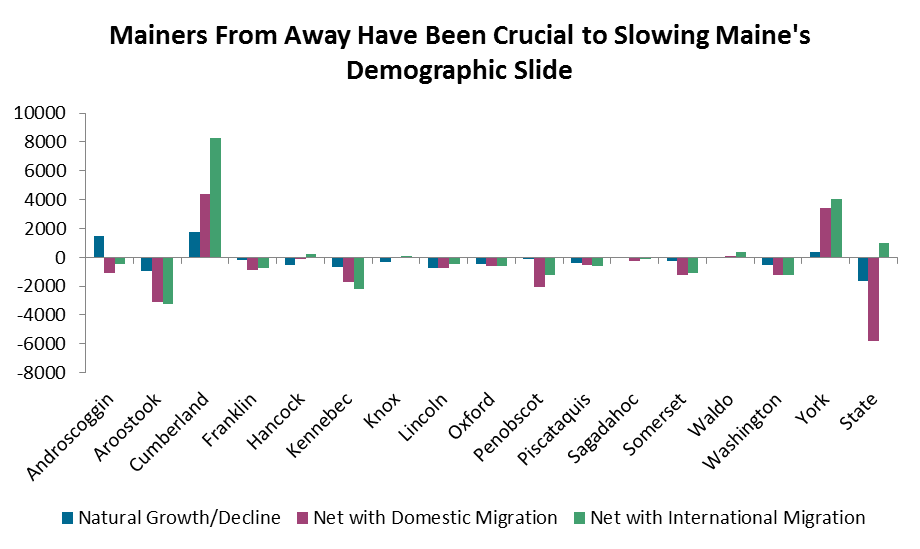We need to ensure that the benefits of immigration are available to all parts of Maine. It’s fair to acknowledge that many Maine towns just lack the resources to easily support translators, adult education classes, or career navigators. By offering all Maine towns the chance to receive funding to assist New Mainers in their communities, this legislation ensures that no part of the state is left behind, and that we don’t create a false competition for resources between those born here and those from away, or between different towns and cities in our state.
Good morning Senator Langley, Representative Kornfield, and members of the Joint Committee on Education and Cultural Affairs. My name is James Myall, a policy analyst at the Maine Center for Economic Policy, and I am here to testify in support of LD 1492 because we recognize Maine’s urgent need to attract and support more workers from every quarter.
That Maine is facing an urgent demographic crunch is so well known that it is in danger of becoming a cliché. But it remains the biggest threat to our future economic prosperity. Between 2010 and 2015, Maine’s natural population growth resulted in a net decline of 1,600. A net of 4,000 people left the state for elsewhere in the country. Only the arrival of 7,000 Mainers from abroad kept our population from declining during this period.[1] Fewer workers mean a shrinking economy, fewer jobs, and lower state revenues to support an aging population with greater needs. The only practical solution to this problem is to invest in attracting and retaining people from out of state.

Source: MECEP analysis of US Census Bureau, Estimates of the Components of Population Change, 2010-15
New Mainers are not the only source of potential workers for our state. But we would be foolish not to pursue an “all of the above” strategy that looks to immigrants as well as born Mainers and Americans from away. New Mainers are particularly worthy of state investment because they have potential that is often held back by their circumstances. The average profile of a New Mainer is younger and more educated than our existing population. The median age of New Mainers who came to this country after 2000 is 27, compared to the state average of 43, and 23% have a bachelor’s degree, compared to the 18% of our current population.[2] But all too often these individuals can’t fully participate in our economy because they have language barriers or because their foreign credentials or professional licenses aren’t recognized in Maine. Establishing an Office of New Mainers and expanding our network of welcome centers will help thousands of New Mainers overcome these barriers and thrive in our economy. And when all Mainers can participate to their full potential, we all benefit.
I want to especially commend this legislation for its statewide approach. The contribution of New Mainers has helped to sustain Portland’s reputation as a hotspot in Maine’s economy, and to revitalize Lewiston. A report by the Pew Center found that the Lewiston-Auburn metro area saw the greatest increase in income growth since 2000, even as its minority population share doubled. The share of its population with a bachelor’s degree also doubled during this period.[3]
We need to ensure that the benefits of immigration are available to all parts of Maine. It’s fair to acknowledge that many Maine towns just lack the resources to easily support translators, adult education classes, or career navigators. By offering all Maine towns the chance to receive funding to assist New Mainers in their communities, this legislation ensures that no part of the state is left behind, and that we don’t create a false competition for resources between those born here and those from away, or between different towns and cities in our state.
Maine has done this before. In the mid-19th century, thousands of Mainers grew tired of “farming rocks” and headed west to Ohio, California, and elsewhere. There was general dismay about their equivalent of our present day “brain drain.” But their places were taken by tens of thousands of new arrivals―from Ireland, French Canada, and all corners of the world. In their own way, your 19th century predecessors provided incentives and supports, including public schools for French-speaking children and adult education classes for their parents. The New Sweden land grants were financed by the state. Those new arrivals powered Maine’s industrial revolution, resuscitated the abandoned farms, and gave us many of our enduring traditions. Let’s repeat the best of the past and once again nurture New Mainers who have the power to transform our state.
This legislation is a necessary part of reinvigorating our 21st century economy. This isn’t a zero-sum game. Investment to support New Americans pays off. Research shows that investment in immigrants pays off with the contributions to the economy made by second-generation immigrants. A recent report from the National Academies of Sciences, Engineering and Medicine found that first-generation immigrants returned a net benefit of $700 per person to the state revenues, while their children returned a net of $2,400. That’s more than three times the net benefit of all Mainers.[4] Once we help New Mainers overcome language and qualification hurdles, they help make our economy more dynamic to the benefit of us all.
Offices of New Americans have been successful in states like Illinois, Michigan, Maryland, New York and cities like Chicago, Nashville, and Baltimore, as well as our own city of Portland. A similar office could bring similar benefits to Maine by coordinating efforts to increase and support our New Mainer population, and we urge the committee to support the bill before you.
Thank you. I’ll be happy to answer any questions.
[1] US Census Bureau, Estimates of the Components of Population Change, 2010-15
[2] https://www.mecep.org/immigrants-including-refugees-are-good-for-maine/
[3] http://blog.mecep.org/2016/05/report-on-americas-shrinking-middle-class-offers-some-bright-spots-for-maine-lewiston-auburn/
[4] Francine Blau, Christopher Mackie, “The Economic and Fiscal Consequences of Immigration,” National Academies of Science, Engineering, Medicine. Washington D.C., 2016. Available at https://www.nap.edu/catalog/23550/the-economic-and-fiscal-consequences-of-immigration
[pdf-embedder url=”https://www.mecep.org/wp-content/uploads/2017/05/LD-1492_Office-of-New-Mainers_05-10-17.pdf” title=”LD 1492_Office of New Mainers_05-10-17″]


